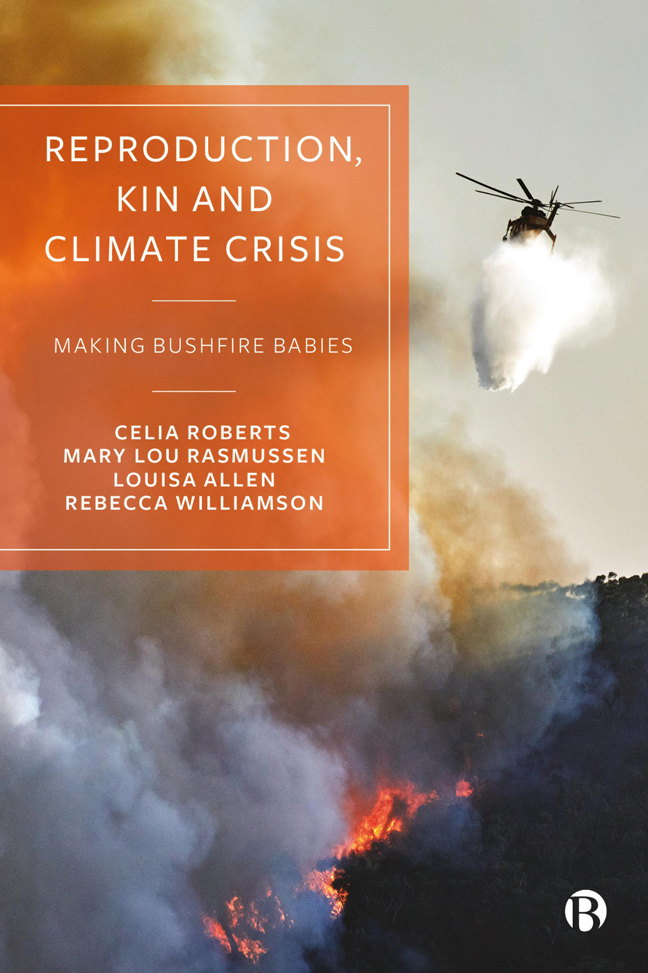Book contents
- Frontmatter
- Contents
- List of Figures and Table
- Notes on the Figures
- Notes on the Authors
- Acknowledgements
- Interleave 1
- 1 Reproducing in Climate Crisis
- Interleave 2
- 2 Methods in Crisis
- Interleave 3
- 3 Breath, Breathing and ‘Mum-Guilt’
- Interleave 4
- 4 Smoke, Machines and Public Health
- Interleave 5
- 5 Kin, Care and Crises
- Interleave 6
- 6 Pyro-reproductive Futures
- Interleave 7
- 7 Making Bushfire Babies
- Notes
- References
- Index
Interleave 1
Published online by Cambridge University Press: 24 January 2024
- Frontmatter
- Contents
- List of Figures and Table
- Notes on the Figures
- Notes on the Authors
- Acknowledgements
- Interleave 1
- 1 Reproducing in Climate Crisis
- Interleave 2
- 2 Methods in Crisis
- Interleave 3
- 3 Breath, Breathing and ‘Mum-Guilt’
- Interleave 4
- 4 Smoke, Machines and Public Health
- Interleave 5
- 5 Kin, Care and Crises
- Interleave 6
- 6 Pyro-reproductive Futures
- Interleave 7
- 7 Making Bushfire Babies
- Notes
- References
- Index
Summary
Flying to Canberra, December 2019: Louisa's story
In early December I set out from Aotearoa-New Zealand for a conference in Canberra, where Mary Lou and I were to present a paper entitled ‘Crisis, sexuality education, reproduction and kinship’. My journey involved a stopover in Sydney, where the smoke was inescapable. I remember my shock as the plane landed and there was no difference between the colour of the sky and the tarmac – both were grey. This didn't look anything like an overcast day; this shade of grey spoke of something being terribly wrong. As I peered from the plane window, I also noticed that ground staff working on the tarmac were wearing masks, which at this pre-COVID-19 time was a highly unusual occurrence. After landing and hearing the usual announcements about disembarking, there was an additional notice reassuring passengers that the smell of smoke, which had now penetrated the plane, was not something burning onboard, but caused by the fires outside. I didn't feel reassured; I remember thinking this is just awful, this beautiful city is being smothered in smoke, how in the world are people living in this? In the course of transferring to the flight for Canberra, I had to exit the international terminal building. The first blast of air as the sliding glass doors opened was a shock, even though I’d registered that the smoke was everywhere. My first gulp was like standing by a bonfire on Guy Fawkes Night without the ability to retreat from the stronger fumes. The combined heat and smoke made my eyes water and I rushed to get back into the air-conditioned and comparatively smokeless sanctuary of the national terminal.
Having now smelt the smoke and experienced it (albeit on a very small scale), even this did not prepare me for the view from the plane as we travelled south to Canberra. As I looked out the window, I could see lines of fire moving through the bush for kilometres upon end. Thick clouds of smoke hung over areas where the fire was thickest and I remember thinking this is truly an environmental tragedy. What amazed me though was that while I was transfixed by the fires, unable to pull my gaze from the window, no one else in the crowded plane was paying them any attention.
- Type
- Chapter
- Information
- Reproduction, Kin and Climate CrisisMaking Bushfire Babies, pp. 1 - 2Publisher: Bristol University PressPrint publication year: 2023



